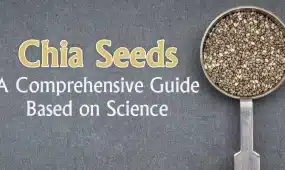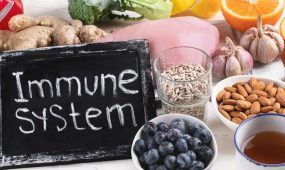What’s the hottest topic in the wellness world these days?
The microbiome.
Researchers are uncovering more each day about the complexity of our guts. What we know now is that the gut does way more than just break down food.
A diverse microbiota is associated with a healthy immune system, heart, and brain [1].
So how do you keep your gut happy and healthy?
Hint – it’s not just about what you eat.
In this sense, taking good care of your gut requires a multipronged approach:
- nutrition
- physical activity
- self-care
Here are five ways you can start nurturing your gut today:
1. Eat Probiotic-Rich Foods
Probiotics are bacteria, but they’re the good guys. Two of the most common groups of probiotics are lactobacillus and bifidobacterium, and studies show that certain strains may lower LDL cholesterol levels, support digestive health, and boost the immune system [2]. As an example, fermented dairy products have been shown to help lower cholesterol in both human and animal subjects [3].
High quality probiotics may also benefit the brain by supporting cognitive function and reducing symptoms of stress, depression, and anxiety. These study results seem plausible as the brain and gut are closely linked through biochemical signaling and nervous system functioning, although more research in this arena is needed to draw definitive conclusions about probiotics and mental health [4].
Food sources rich in probiotics include:
- yogurt
- aged cheeses
- kefir
- sauerkraut
- kimchi
- miso
- tempeh
- natto
Try to get your probiotic fix from foods first. If you wish to take a supplement to meet your needs, consult with a registered dietitian or physician.
KNOW MORE ABOUT: Dr. Gundry MD Bio Complete 3 Supplement Reviews
2. Eat Prebiotic-Rich Foods
Probiotics won’t go far without a steady supply of fuel, and that’s where prebiotics come into play.
Prebiotics are indigestible fibers that provide essential energy for good bacteria and may improve gastrointestinal health.
Prebiotic-rich foods include onions, garlic, artichokes, bananas, asparagus, leeks, and whole grains. Eat a variety of these sources to reap the benefits.
3. Manage Stress
What you eat is important, but it’s only once piece of the puzzle for fostering a healthy gut environment. Research indicates that stress can disrupt the balance in the microbiome and is associated with inflammatory conditions and diseases.
According to Dr. Barry Sears “The gut microbiome impacts your body by metabolizing fermentable fiber into short-chain fatty acids (SCFA), which provide energy to gut cells, act as signaling agents to control metabolic pathways and break down polyphenols into small compounds that can reduce inflammation and oxidative stress throughout the body.”
Stress has been shown to elevate the fight or flight hormones and reduce the amount of short-chain fatty acids, a byproduct of fermentation, in the gut [5]. This just goes to show that self-care is not selfish, but rather a necessary part of keeping your gut in good condition.
It’s not that you need to eradicate all stress from your life. We know that’s pretty much impossible anyway. But by keeping your stress at a manageable level, you are not only easing your mind but also supporting digestive processes.
If you find that your stress is related to eating, it may help to consult with a registered dietitian so you can cultivate a positive relationship with food.
There is no one right way to manage stress. The key is finding activities that work for you and creating a routine that is consistent.
Some ideas for managing stress include:
- Meditation
- Yoga
- Physical activity
- Talking to someone: a friend, therapist, or dietitian
- Journaling
- Getting adequate sleep
4. Eat Mindfully
Remember that digestion begins in the mouth and your gut doesn’t have teeth. Eating slowly and mindfully can help you digest food adequately and prevent bloating and stomach upset.
Keep in mind that it also takes time for your brain to register fullness during a meal. Once satiety hormones are released from the gut, it can take about 20 minutes for the hypothalamus to get the signal.
Try eating your meals sitting down and remove distractions so you can tune into your hunger and fullness effectively.
5. Move Your Body
Physical activity affects the makeup of the microbiota. In animal and human studies, consistent exercise induced changes in the microbiota independent of diet [6].
While the mechanism between exercise and the microbiome is unclear, it appears that physical activity offers benefits for the gut [6].
When developing an exercise routine, choose activities that you enjoy so you’re more likely to stick with it.
Don’t you like running?
Try biking, swimming, dancing, or an aerobics class.
Conclusion
As you can see, there are many things you can do to keep your gut happy and healthy. Finding a balance of self-care practices that fit into your lifestyle is the key.
SOURCES
Health Insiders relies on peer-reviewed studies, academic research institutions, and medical associations. We avoid using tertiary references. You can learn more about how we ensure our content is accurate and current by reading our editorial policy.
[1] Valdes Ana M, Walter Jens, Segal Eran, Spector Tim D. Role of the gut microbiota in nutrition and health BMJ 2018; 361 :k2179.
[2] Marchesi JR, Adams DH, Fava F, Hermes GD, Hirschfield GM, Hold G, Quraishi MN, Kinross J, Smidt H, Tuohy KM, Thomas LV, Zoetendal EG, Hart A. The gut microbiota and host health: a new clinical frontier. Gut. 2016 Feb;65(2):330-9. doi: 10.1136/gutjnl-2015-309990. Epub 2015 Sep 2. PMID: 26338727; PMCID: PMC4752653.
[3] Kumar M, Nagpal R, Kumar R, Hemalatha R, Verma V, Kumar A, Chakraborty C, Singh B, Marotta F, Jain S, Yadav H. Cholesterol-lowering probiotics as potential biotherapeutics for metabolic diseases. Exp Diabetes Res. 2012;2012:902917. doi: 10.1155/2012/902917. Epub 2012 May 3. PMID: 22611376; PMCID: PMC3352670.
[4] Bousvaros A. Can probiotics help treat depression and anxiety? Harvard Health Publishing Harvard Medical School website July 26, 2017. Accessed October 6, 2019. https://www.health.harvard.edu/blog/can-probiotics-help-treat-depression-anxiety-2017072612085
[5] Maltz RM, Keirsey J, Kim SC, Mackos AR, Gharaibeh RZ, Moore CC, Xu J, Bakthavatchalu V, Somogyi A, Bailey MT. Prolonged restraint stressor exposure in outbred CD-1 mice impacts microbiota, colonic inflammation, and short chain fatty acids. PLoS One. 2018 May 9;13(5):e0196961. doi: 10.1371/journal.pone.0196961. PMID: 29742146; PMCID: PMC5942810
[6] Allen JM, Mailing LJ, Niemiro GM, Moore R, Cook MD, White BA, Holscher HD, Woods JA. Exercise Alters Gut Microbiota Composition and Function in Lean and Obese Humans. Med Sci Sports Exerc. 2018 Apr;50(4):747-757. doi: 10.1249/MSS.0000000000001495. PMID: 29166320







 This article changed my life!
This article changed my life!
 This article was informative.
This article was informative.
 I have a medical question.
I have a medical question.
 Ask a Question
Ask a Question

 This article contains incorrect information.
This article contains incorrect information.
 This article doesn’t have the information I’m looking for.
This article doesn’t have the information I’m looking for.